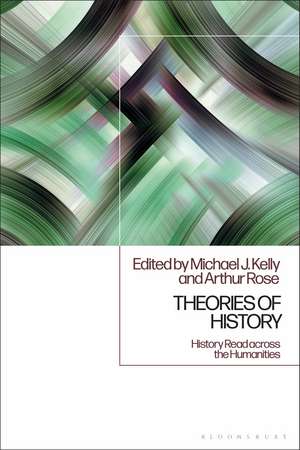Theories of History: History Read across the Humanities
Editat de Dr. Michael J. Kelly, Dr Arthur Roseen Limba Engleză Paperback – 27 noi 2019
| Toate formatele și edițiile | Preț | Express |
|---|---|---|
| Paperback (1) | 231.34 lei 6-8 săpt. | |
| Bloomsbury Publishing – 27 noi 2019 | 231.34 lei 6-8 săpt. | |
| Hardback (1) | 715.73 lei 6-8 săpt. | |
| Bloomsbury Publishing – 16 mai 2018 | 715.73 lei 6-8 săpt. |
Preț: 231.34 lei
Preț vechi: 265.35 lei
-13% Nou
Puncte Express: 347
Preț estimativ în valută:
44.27€ • 46.38$ • 36.59£
44.27€ • 46.38$ • 36.59£
Carte tipărită la comandă
Livrare economică 12-26 aprilie
Preluare comenzi: 021 569.72.76
Specificații
ISBN-13: 9781350142992
ISBN-10: 1350142999
Pagini: 264
Ilustrații: 11 bw illus
Dimensiuni: 156 x 234 x 18 mm
Greutate: 0.37 kg
Editura: Bloomsbury Publishing
Colecția Bloomsbury Academic
Locul publicării:London, United Kingdom
ISBN-10: 1350142999
Pagini: 264
Ilustrații: 11 bw illus
Dimensiuni: 156 x 234 x 18 mm
Greutate: 0.37 kg
Editura: Bloomsbury Publishing
Colecția Bloomsbury Academic
Locul publicării:London, United Kingdom
Caracteristici
Unique in its approach, the first book to cover the broad scope of the humanities in this topic
Notă biografică
Michael J. Kelly is Visiting Assistant Professor in Comparative Literature at the State University of New York at Binghamton, USA. He is the General Director of the project Networks and Neighbours and Co-General Director, with Dolores Castro, of the series Visigothic Symposia. Arthur Rose is a Postdoctoral Research Fellow in English Studies and Medical Humanities at Durham University, UK. He is the author of Literary Cynics: Borges, Beckett, Coetzee (Bloomsbury, 2017).
Cuprins
List of FiguresList of ContributorsAcknowledgementsEditorial Note1. Introduction: Evental History and the Humanities, Michael J. Kelly (State University of New York at Binghamton, USA)2. From the Extended Mind to the Anthropocene: Rethinking Scale in Literary History, Arthur Rose (Durham University, UK)3. How We Got Out of Music History, and How We Can Get Back into It, J. P. E. Harper-Scott (Royal Holloway, University of London, UK) 4. Humanist Matters, Adi Efal-Lautenschläger (University of Cologne, Germany)5. The Rhetoric of Time and the Time of Rhetoric, Rik Peters (University of Groningen, Netherlands)6. Past, Present, and Future, F. R. Ankersmit (University of Groningen, Netherlands)7. The Nigerian "History Machine", Samaila Suleiman (Bayero University Kano, Nigeria)8. History as a Scam: Confrontation and Resentment between Archaeology and History, Andre Szczawlinska Muceniecks (State University of Campinas, Brazil)9. Alternative Forms of Historical Writing: Concepts and Facts in Goya's Disasters of War, Javier López-Alós (Universidad Complutense de Madrid, Spain)10. "Methods of Reasoning and Imagination": History's Failures and Capacities in Anglophone Design Research, Sarah Teasley (Royal College of Arts, UK) NotesIndex
Recenzii
The contributions are invariably thought provoking . [For] those in the field and interested in the theory of history it is a rewarding read and a valuable contribution on multiple levels.
Theories of History: History read across the Humanities is a major achievement in more than one sense. It instigates thinking about history form a refreshingly new perspective, inspired by the work of Alain Badiou, and staring from the following preamble: History is not about finding or creating truths; truths find history. The book raises all the right questions, to which it provides a truly engaging and genuinely collective response.
This intellectually elegant collection of essays explores the complexities of historical theory as it applies to the humanities, broadly conceived. Its learned contributors examine the implications of historical theory to events, musical interpretation, art as a form of "visual writing," the contexts and rhetorics of conceptions of time, and the implications of imposing boundaries between the past, present, and future, among other absorbing topics. A collective work of erudition, insight, and scholarly imagination, Theories of History neatly challenges disciplinary boundaries. It will reward attentive readers in every humanistic field.
In a series of case studies and theoretical reflections from across the humanities-from archaeology to law to rhetoric-the book gives a vivid snapshot of the most progressive thinking on history today. And if, in its editors' conviction of the power of Alain Badiou's 'evental' vision of history, we seem to approach a theology (rather than a philosophy) of history, the book is exemplary in its attention to the diverse contexts in which history emerges as a vital profession and invigorating problem.
Theories of History: History read across the Humanities is a major achievement in more than one sense. It instigates thinking about history form a refreshingly new perspective, inspired by the work of Alain Badiou, and staring from the following preamble: History is not about finding or creating truths; truths find history. The book raises all the right questions, to which it provides a truly engaging and genuinely collective response.
This intellectually elegant collection of essays explores the complexities of historical theory as it applies to the humanities, broadly conceived. Its learned contributors examine the implications of historical theory to events, musical interpretation, art as a form of "visual writing," the contexts and rhetorics of conceptions of time, and the implications of imposing boundaries between the past, present, and future, among other absorbing topics. A collective work of erudition, insight, and scholarly imagination, Theories of History neatly challenges disciplinary boundaries. It will reward attentive readers in every humanistic field.
In a series of case studies and theoretical reflections from across the humanities-from archaeology to law to rhetoric-the book gives a vivid snapshot of the most progressive thinking on history today. And if, in its editors' conviction of the power of Alain Badiou's 'evental' vision of history, we seem to approach a theology (rather than a philosophy) of history, the book is exemplary in its attention to the diverse contexts in which history emerges as a vital profession and invigorating problem.
